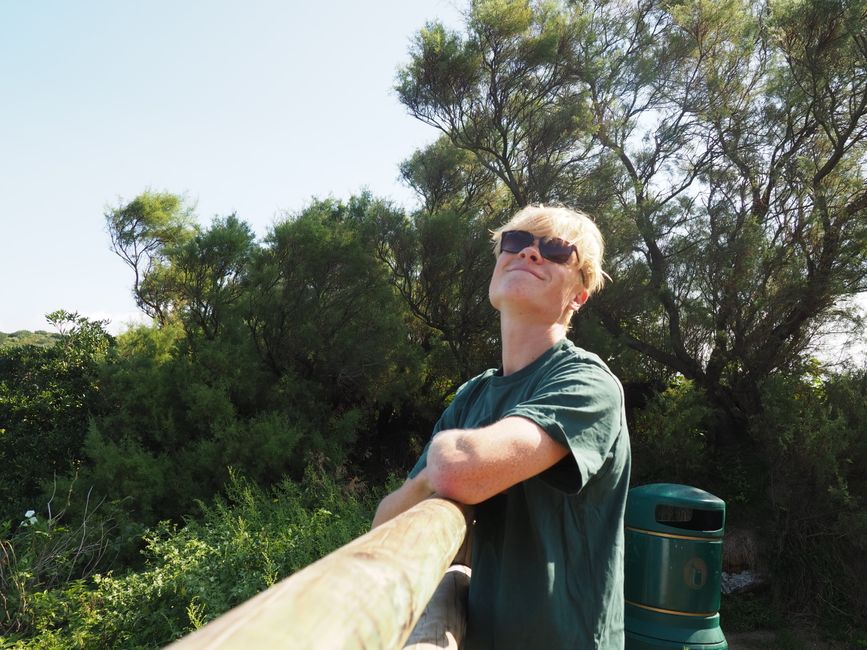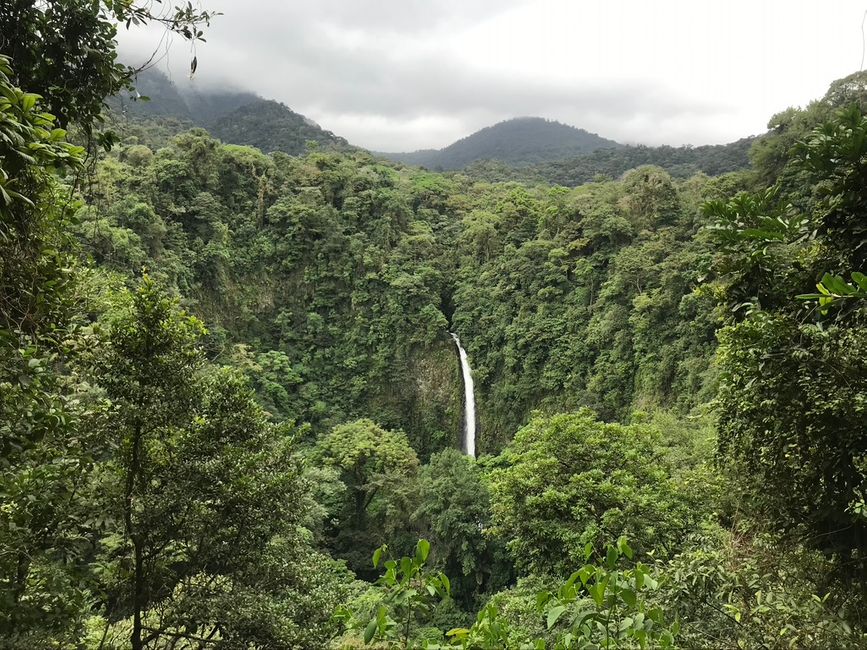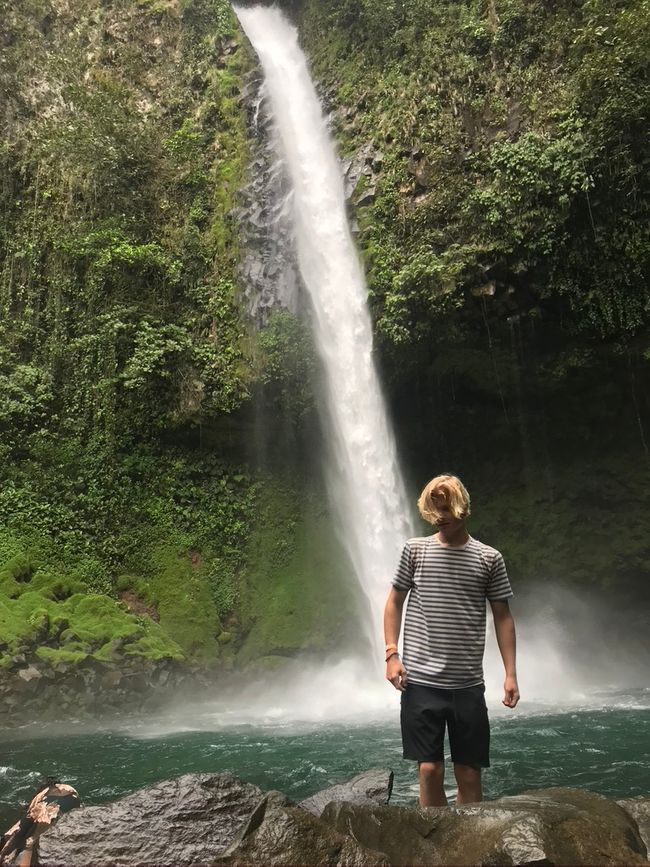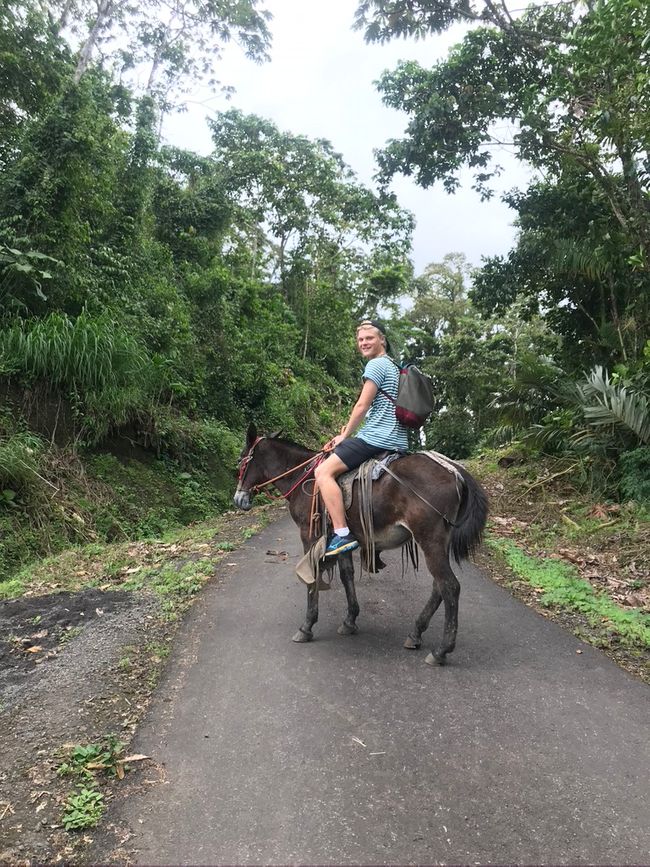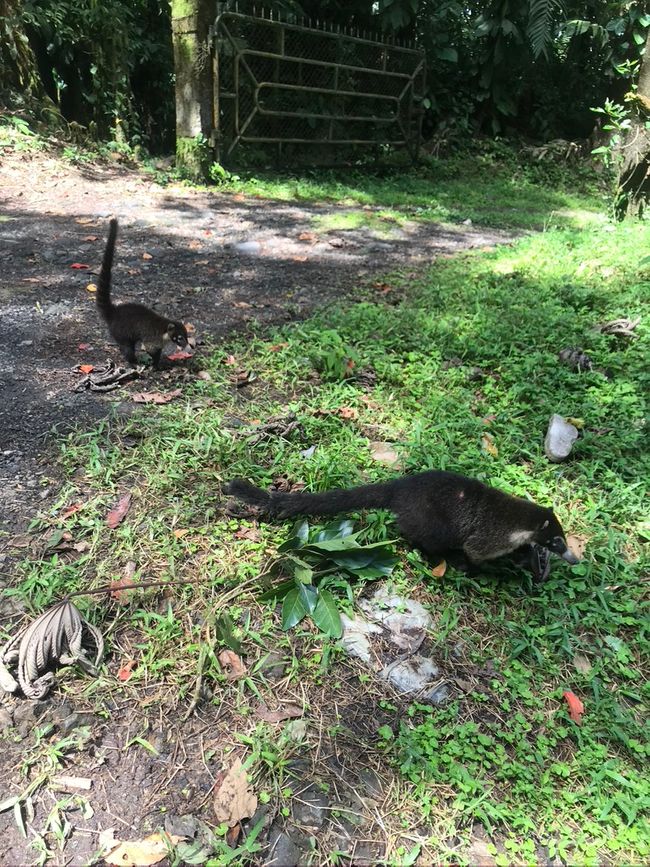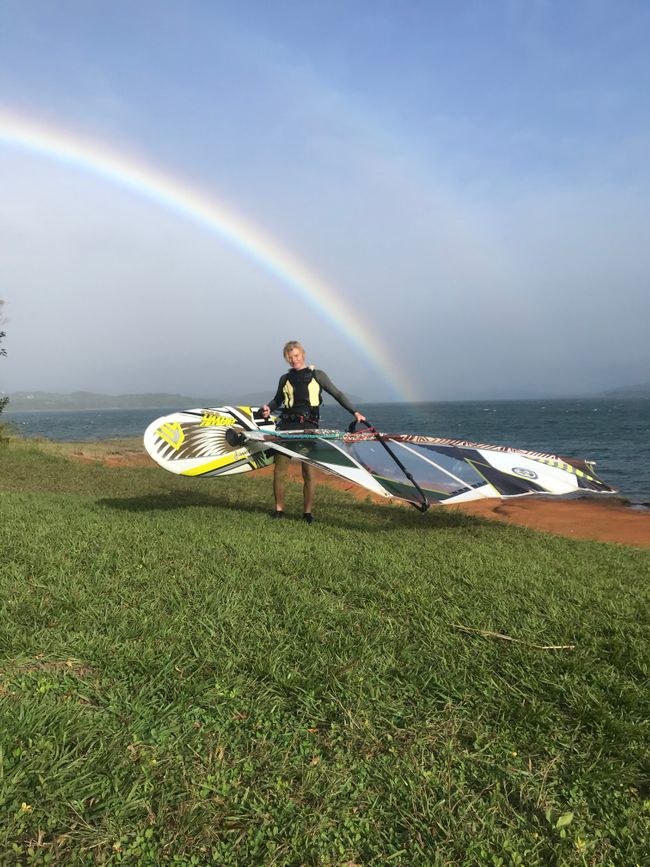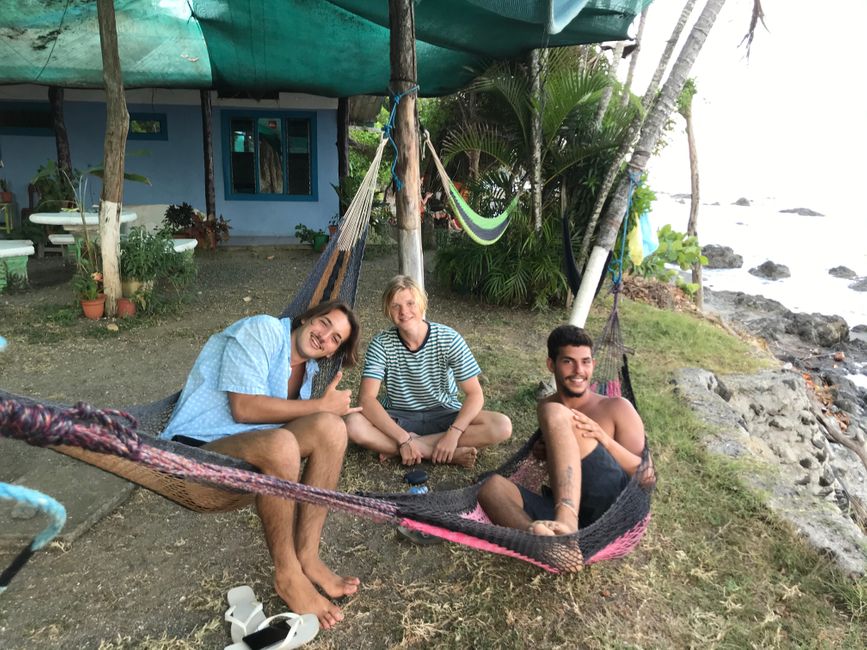Across the Country
発行済み: 18.02.2021
ニュースレターを購読します
So three weeks ago, I set off to explore the country a little more after my four months in the Caribbean. It wasn't easy to choose a few places because Costa Rica has so much to offer. After a few conversations with the locals, I finally figured out what I wanted to see and what was easily accessible by bus.
First, I went to La Fortuna with the other volunteer from the Araprojekt. There, you can find Costa Rica's most impressive waterfall, surrounded by lush vegetation and very close to Costa Rica's most active volcano, Arenal. Overall, the landscape looks like Jurassic Park. However, this region is very touristy, so I only stayed there for three days. Nevertheless, we saw a lot there. For example, we went on a hike through the highlands of the volcano. It felt like walking through different climate zones. First, we walked on a jungle path where we were surrounded by mosquitoes and walked through mud. Then we suddenly came out to a meadow with a perfect view of the cloud-covered volcano. Then we walked through cow pastures that could have been in Scotland, apart from the occasional parrots and palms. And finally, we walked up the mountain on volcanic stones and waited for the top of the volcano to become visible. However, this rarely happens. We were unlucky, but on the way back, we saw an older man riding on a mule. I asked him if I could take his picture. He replied that I should just sit on the mule myself. So I rode a long way on the mule. After the hike, we also bathed in the hot springs next to the national park. It felt like being in a thermal bath, but with hummingbirds flying above us.
The next day, I continued on my own by bus to the other side of the large Arenal Lake. I wanted to fulfill a dream there and go windsurfing at the foot of two volcanoes. When the bus driver dropped me off in the small village of Piedras, I had no idea how to get to my hotel. I asked for a taxi at the local pub, but they told me there were no taxis here, but I should ask at the Pulperia, they would find a solution. The owner of the Pulperia, a small corner shop, told me he could take me to the hostel. But first, he had to empty all the bananas from his car. The hostel was beautiful, with a perfect view of the lake, and the owners are Italian, so there was delicious pizza every evening. But the climate was completely different again. I immediately felt the strong cool wind blowing over the hills. I couldn't wait and ran down the hill and along the road until I finally discovered the tiny sign 'Tico Wind'. From there, a muddy path led two kilometers through the densely overgrown peninsula. Along the path, I saw coatis and a turtle. Finally, I reached the top of the peninsula, where I saw a unique windsurfing spot. About 15 windsurfers and kitesurfers raced across the lake at wind speeds of six to seven. And the equipment they used was top-notch. 30 years ago, an Englishman discovered this spot and decided to open a windsurf rental shop, even though there was no electricity or water within 20 kilometers. Now he has regular customers from the United States and Canada who have been coming here to windsurf every year for 20 years. One couple had been there for two months already and told me that there had only been one day when they couldn't go windsurfing with a small sail. On the first day, I struggled with the strong wind. I had to be careful not to drift too far, because a rescue with a jet ski would have cost me $60. And everyone knew that, so it would have been a kind of 'walk of shame'. But fortunately, I made it back on my own every time, and on the following days, I also went back and forth and jumped over the waves. An incredible experience, because it felt like diving into a different world in this place.
Next, I was supposed to go to Montezuma, a hippie village on the Nicoya Peninsula. I didn't really know how to get there exactly. I only knew that I had to take the ferry from Puntarenas to the peninsula. So I stood by the road early in the morning and took the next bus to the nearest town. From there, I had to figure out how to get there. I took a total of 5 buses and a ferry that day, but it was definitely worth it for Montezuma. The town consists of one block with small shops, hostels, restaurants, street vendors, and two beaches. When I arrived, I immediately felt the warm community. It seemed like everyone had been here forever, but most of the Spanish and French backpackers had only been there for one or two days. I immediately started talking to some of them. It turned out that the whole village went out onto the street in front of a restaurant in the evening, where a band played songs by Manu Chao with a guitar and drums. Afterward, most people sat around the campfire on the beach. The next day, I met Mateo from Argentina, Raoul from Quebec, and Eitan from Israel. I ended up spending the next 9 days with these guys, even though I had originally planned to stay there for only two nights. During the day, we usually walked to the Catarata de Montezuma, a 27-meter high waterfall where you can jump into a 10-meter deep lagoon from different heights. I jumped from a height of about 12 meters. It was an adrenaline rush because in the air, you ask yourself, 'What am I doing here?' Afterward, we always ate at the same restaurant. It was much cheaper than buying food at the supermarket, and the portions of rice were huge. The waiters at 'Soda El Artesano' already knew us. In the afternoons, we usually lay in the hammocks on the beach in front of the hostel and talked about world-changing and less world-changing topics. After the sunset, we took a nap in the hammock before going back out onto the street and to the campfire. At the campfire, we met people from different nations every evening. However, after a while, it became quite boring to answer the same questions over and over again. Where are you from? How long are you staying here? Are you traveling alone? So we started coming up with answers. Mateo and I claimed to be brothers from Argentina. We told a Spaniard that we were in the area because we wanted to buy an island off the coast of Panama for $60 million. And we told another traveler that Mateo was a famous model from Argentina who had come here for a few photo shoots at the waterfall and the beaches. In fact, people believed our stories every time. Of course, we only told the stories to a certain extent, until we had to 'get drinks'. In Montezuma, we also met some strange people. Here are a few examples:
1. The genocide guy...There was an old man in our hostel who looked like a hippie, but every time he passed by Eitan, the Israeli, he sang 'Genocide, genocide, I like genocide'. When I lost my cell phone, he claimed that my karma was responsible for it because I supposedly disturbed him during his nap.
2. The conspiracy theorist...One evening, we talked to a Canadian who was convinced that the world was ruled by dark forces. He said he couldn't explain his theory to us because our brains weren't capable of understanding it. Unfortunately, I left my cell phone on the bench during this conversation, and later, when we found the man, he only gave it back to me after a long discussion and for a 'finder's fee' of $25.
3. The roulette king...In Montezuma, there was a roulette machine that served as the local casino. Every evening, the roulette king came to the machine with a big backpack. On the first few evenings, we thought that the guy knew the algorithm of the machine because we constantly saw him filling his backpack with coins. But later, we took a closer look at his way of playing. He bet on every number, but he bet more money on some numbers than on others. That's why he always won at least twelve coins but lost more overall than he won.
I was already sad when I continued to Santa Teresa, but I was also really looking forward to surfing again. After Montezuma, Santa Teresa was a shock to me. There was only one dusty road, and everything was crowded with people. But the waves were beautiful. I immediately bought a cheap surfboard and paddled out. Until sunset, I rode a few waves, then suddenly I heard an announcement: 'All surfers who are not participating in the competition, please go to a different spot!' The current had carried me to Banana Beach, where a surf competition took place every Monday. I paddled back a bit and watched the pros doing 360-degree jumps or disappearing into the tube.
In Santa Teresa, I met a boy named Max who is also from Hamburg and just as passionate about windsurfing as I am. It was funny to talk about whether it was worth buying a carbon boom and how we used to get the windsurfing equipment to the beach without a driver's license, all in German on the other side of the world.
Now I'm staying in Santa Teresa for a bit longer before heading back to the capital San José and finally back home.
ニュースレターを購読します
答え

